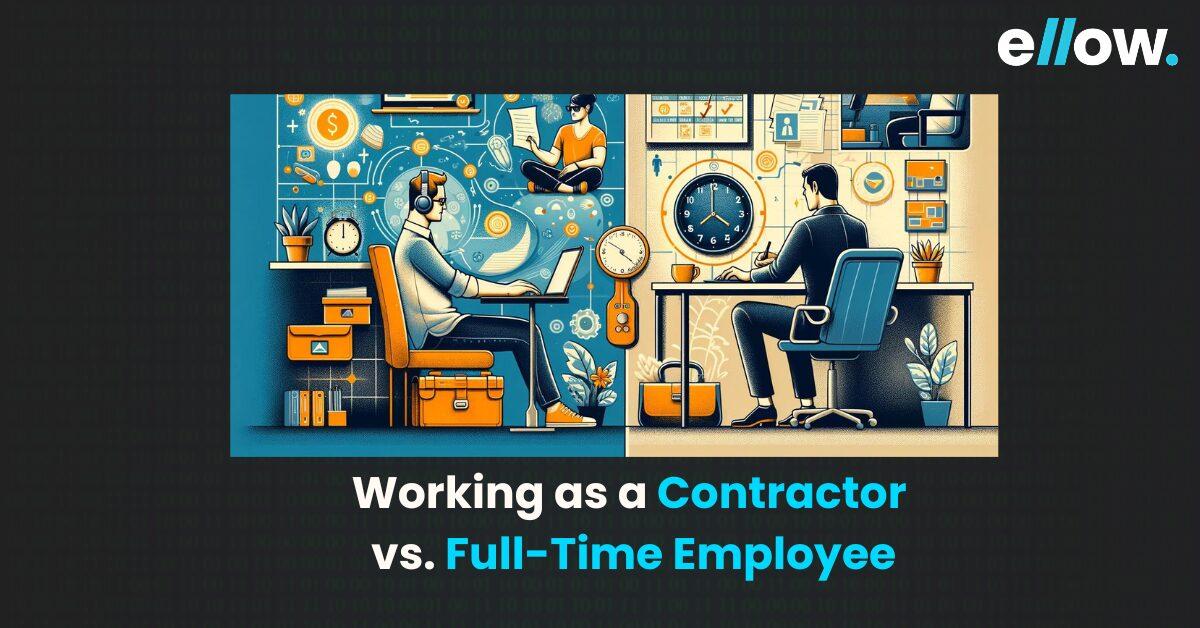Let’s build the future together.
Great ideas need great people. Partner with us to bring your vision to life, or take the first step in your career by joining our team of innovators.

Recent years have witnessed a shift in the professional world, with an increasing number of skilled individuals contemplating a transition from traditional full-time employment to contract work.
The attraction of contract positions is in their flexibility and autonomy, offering professionals the chance to take control of their schedules and explore diverse projects. However, before you leap into contract work, it is crucial to grasp the differences between this model and conventional full-time employment.
This article aims to guide you through the complex decision-making process by shedding light on the key differences between contract work and full-time positions. By looking into the benefits and drawbacks of each arrangement, you will gain valuable insights that will make you make an informed choice that aligns with your career goals.
Whether you’re contemplating a switch or simply exploring your options, understanding the nuances of contract work versus full-time employment is a crucial step toward shaping your professional journey.
Contract work refers to a type of employment arrangement where individuals, known as contractors, are hired by another party (the client or employer) for specific projects or a predetermined period, rather than being employed full-time by an organization. This work arrangement is governed by a formal contract, outlining the terms and conditions of the engagement.
Unlike traditional employment, contract work is typically not permanent and does not usually offer the same benefits (such as health insurance, paid leave, etc.) that a full-time employee might receive. Many businesses also choose to contract digital marketing services to meet specific needs without hiring full-time employees.
Although some contractors manage to find steady streams of projects, the inherent nature of contract employment often leads to unpredictable gaps between assignments, resulting in periods of uncertainty.
Although some contractors manage to find steady streams of projects, the inherent nature of contract employment often leads to unpredictable gaps between assignments, resulting in periods of uncertainty.
Contract workers generally do not receive the same employment benefits as their full-time counterparts, such as health insurance, retirement savings plans, and paid vacation time.
Contractors are responsible for managing their own taxes, invoicing, and other administrative tasks, adding an extra layer of complexity to their professional responsibilities.
A full-time job involves completing daily job-related tasks consistently within a set schedule determined by the company. As a full-time employee, you are expected to adhere to a specific workday and stay in the office throughout your shift.
While full-time employment offers numerous benefits, there are potential drawbacks as well:
Full-time employees are expected to adhere to a fixed schedule, providing limited flexibility compared to contract workers.
Working within a structured organization, full-time employees may have less autonomy compared to freelancers or contractors.
Daily consistency may lead to potential monotony in tasks, affecting job satisfaction for some individuals.
Job security is contingent on the stability of the employing company, and economic downturns may impact job stability.
Understanding the disparities between full-time employment and contract work is important for making career decisions. Explore the differences in the following aspects:
Discover both full-time positions and contract roles on Ellow. Choosing the right path depends on your values, goals, and preferences. As you contemplate the best job for you, consider the aspects discussed in this context to determine which route will lead to the most success and satisfaction in your career.
Whether you’re in the market for full-time or contract employment, Ellow is here to assist. We have numerous job listings for both full-time roles and contract opportunities, ensuring you find exciting work prospects no matter your preferred employment arrangement.
How to Reduce Hiring Biases to Recruit the Best Fits
What is Recruitment Process Outsourcing (RPO)?
The primary differences lie in pay and benefits, work schedules, and job security. Full-time positions often offer benefits and greater job security but may have less flexibility than contract roles.
Individuals opting for full-time employment may prioritize benefits and job security, even if it means sacrificing potential higher earnings and flexibility. It provides a stable, long-term commitment to the employer.
Contract workers enjoy more schedule control and potentially higher paychecks. However, they typically do not receive benefits and lack the job security associated with full-time positions.
Consider your values, goals, and preferences. Evaluate factors like pay, benefits, work schedule, and job security against your priorities to determine which job arrangement aligns best with your needs.
ellow.io serves as a comprehensive platform with a vast online database featuring numerous job postings for both full-time positions and contract opportunities. Whether you prefer the stability of a full-time role or the flexibility of contract work, ellow.io offers diverse options for your career aspirations.

How Top SaaS Companies Build Agile Teams with Remote Developers

How to Hire Vetted Remote Developers in a Hyper-Competitive Market

Top 5 Countries to Hire Remote Developers (and Why)
Please feel free to share your thoughts and we can discuss it over a cup of tea.
Get a quote
How Top SaaS Companies Build Agile Teams with Remote Developers

Six Things to Consider When Hiring Remote Talent

ellow.io enters remote hires market with AI-based screening process